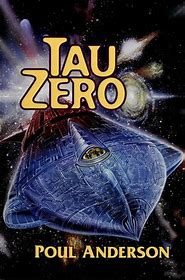A sufficiently large spaceship, constructed in orbit;
an internal ecology;
a crew able to procreate but also to control its population;
scientific work plus live and screened entertainment;
means of propulsion and acceleration (the higher the velocity, the shorter the voyage and the greater the time dilation effect);
means of communication and navigation;
either a colonizable planet identified in advance by the Webb telescope or the capacity to construct orbiting habitats;
space boats for planetary landings and interplanetary travel;
anything else?

9 comments:
Nothing comes to my mind to add to the list.
I think the ability to construct orbiting habitats is more important. If there is an already living planet, I think it would take decades of careful observation & experiment to determine how to colonize it without ecological disaster. Terraforming a planet would take even longer.
Probably the quickest situation for living on a planet would be a planet with a good mix of elements that is merely too cold for life, like earth in a snowball earth phase. Warm it up with large mirrors & introduce cyanobacteria. You will get an equatorial region with reasonable temperatures fairly quickly, but it will take a long time for those cyanobacteria to make the air breathable. Domed settlements on the surface for a long time. Cf: Komarr in Bujold's Future History.
Doing a lot of construction on the starship during the journey would be a big help in maintaining the skills to construct new orbital habitats in the destination solar system.
I would say we need decades, more likely centuries, of experience with rotating habitats in the solar system before anyone tries a generation ship. Colonizing the outer solar system in such habitats would be done well before anything interstellar.
Excellent points.
Kaor, Paul and Jim!
Both: I mostly agree with these suggestions. And I like Jim's idea that a STL generation ship should be only partly finished before starting its long journey. Give the crew work to do during the trip, as was done with the ship in Anderson's "The Troublemakers"
In addition, a generation ship with a large crew will, like it or not, also need courts and a police force. Because I absolutely would expect to see a full share of crime, violence, and quarrelsomeness among these people.
I also expect a large part of the crew to be religious believers of various kinds: Christians, Jews, Zoroastrians, Buddhists, etc. So we should expect to see the types of clergy these faiths have. Bishops, priests, rabbis, monks, etc.
Ad astra! Sean
IIRC Anderson also had the ship being constructed on the way in the framing story of "Tales of the Flying Mountains"
My thoughts on keeping the skills up also come from what I've heard about the difficulties of building a nuclear reactor in a country that hasn't built one for decades. The skills and supply chain have to be built up. Countries that have been continuously building reactors get the costs down. The costs are high to star up after decades. Someone pointed out that the refurbishments of the CANDU reactors mean that at least part of the supply chain & skill set for building new ones are there in Ontario.
Re: the priests etc. How big a population of believers in each religion do you need for that to be more than a part time job?
Kaor, Jim!
I remember that frame for TALES OF THE FLYING MOUNTAINS, which is among the best stories of that kind, colonization of the Solar System. One of the things I remember from the last story, "Recruiting Nation," were the difficulties the organizers had signing crew willing to leave Sol System forever on a one way journey. Eventually they gave in and decided to accept anyone willing to go: losers, misfits, ex-cons, etc.
Anderson's realistic view was that able, happy, prosperous, successful, etc., people would have little reason and less inclination to pull up stakes and leave behind everything they had gained for a STL journey lasting decades.
I would agree that adherents of various faiths would not likely be numerous enough on a STL generation ship to need many full time clergy. But population would grow as time passed and still more after planetfall. And clergy would likely proportionately increase. Also, there has been many, many Catholic priests who have been scientists. So some clergy might work as scientists on a generation ship.
Ad astra! Sean
A lot of fairly economically successful people emigrated in the great post-1492 surge to the Americas.
They tended to be those whose expectations were limited -- younger sons, members of declining classes -- willing to take a gamble on improving their positions.
Or religious dissidents, to be sure, but their motives were usually 'mixed'. Even the great Puritan exodus to Massachusetts Bay wasn't -purely- religious, tho' the participants often thought of economic questions as God giving them a hint.
Oliver Cromwell seriously considered moving to Massachusetts Bay before the English Civil War.
Now, -that's- an alternate history with some interesting implications!
Kaor, Mr. Stirling!
Men with "limited expectations" in the Home Countries still comes close to being losers.
And what might have HAPPENED if Cromwell had moved to Massachusetts before the Civil War? Would Charles I, with able generals like Prince Rupert, have quickly won the War? How would British history have developed after that???
Ad astra! Sean
Sean: probably Charles would have won. Rupert beat the Parliamentarians like a drum until Cromwell raised the New Model.
Kaor, Mr. Stirling!
Considering how much I dislike those bigoted, canting, ranting Roundheads, good! And if we can go by what Anderson wrote in A MIDSUMMER TEMPEST, he would have preferred the rebel Parliamentarians losing the war.
Ad astra! Sean
Post a Comment